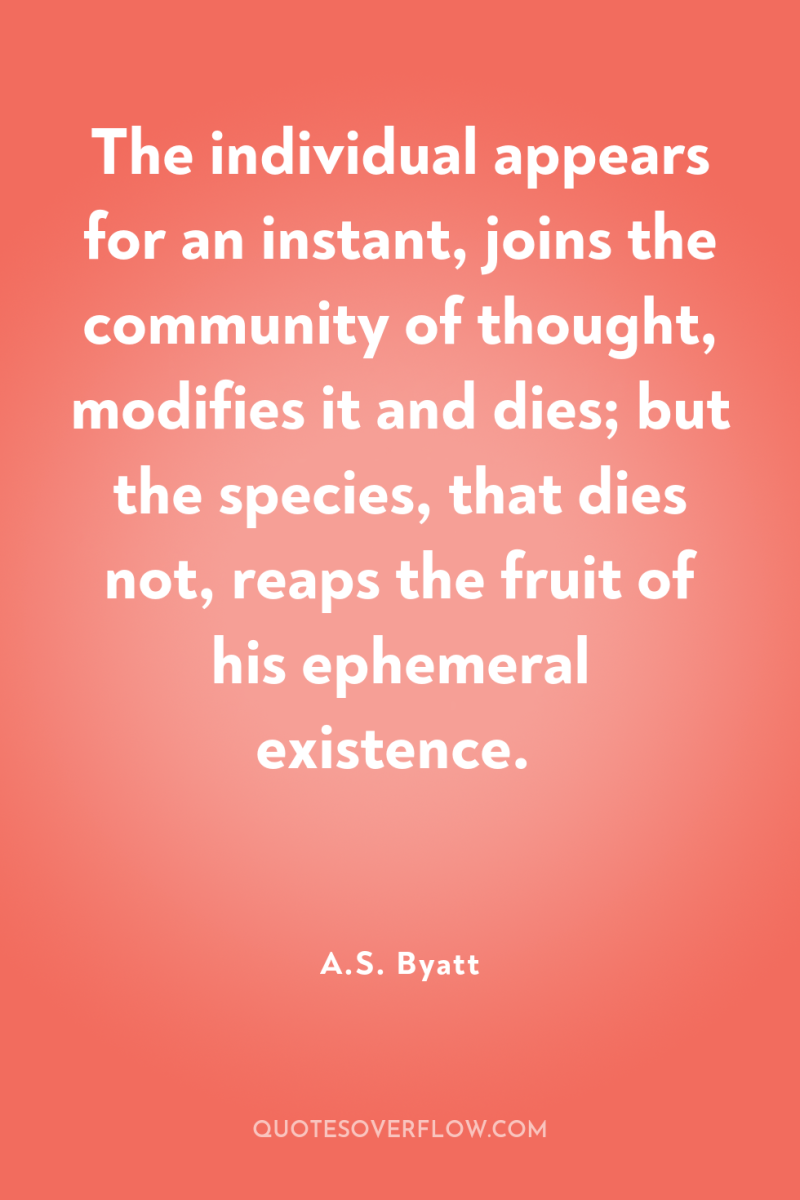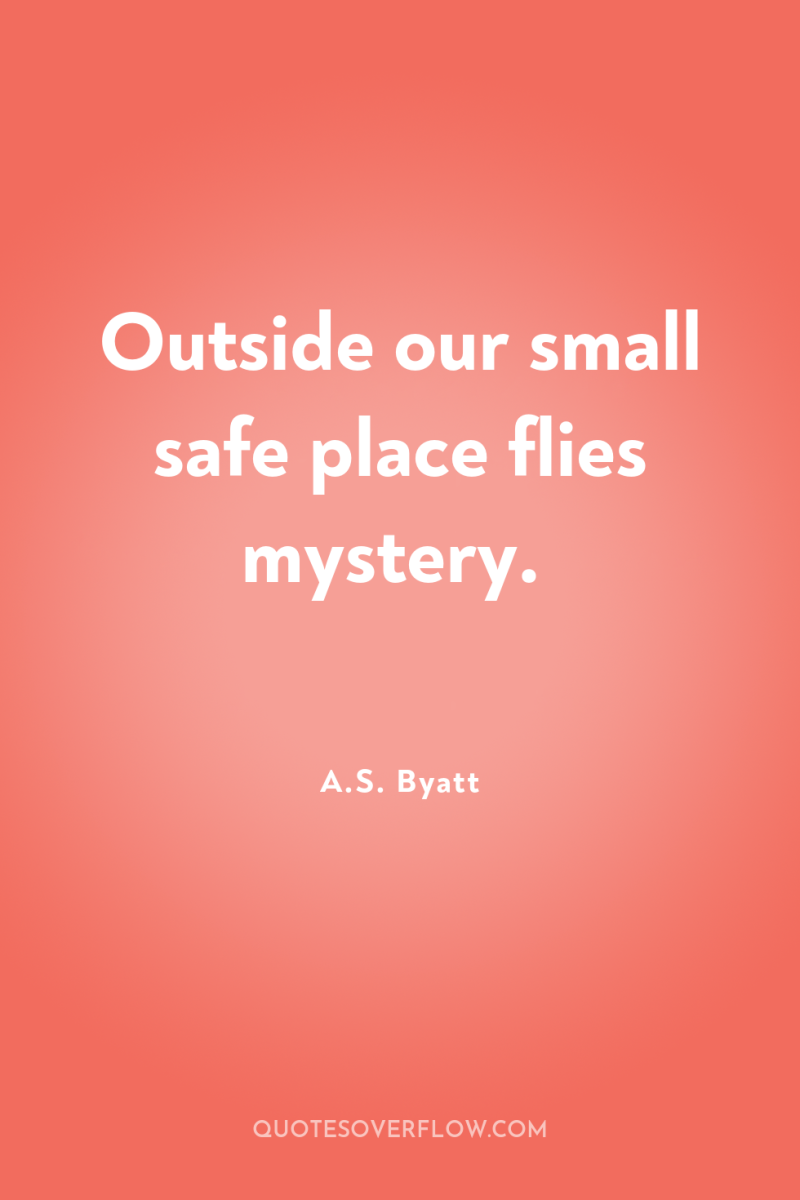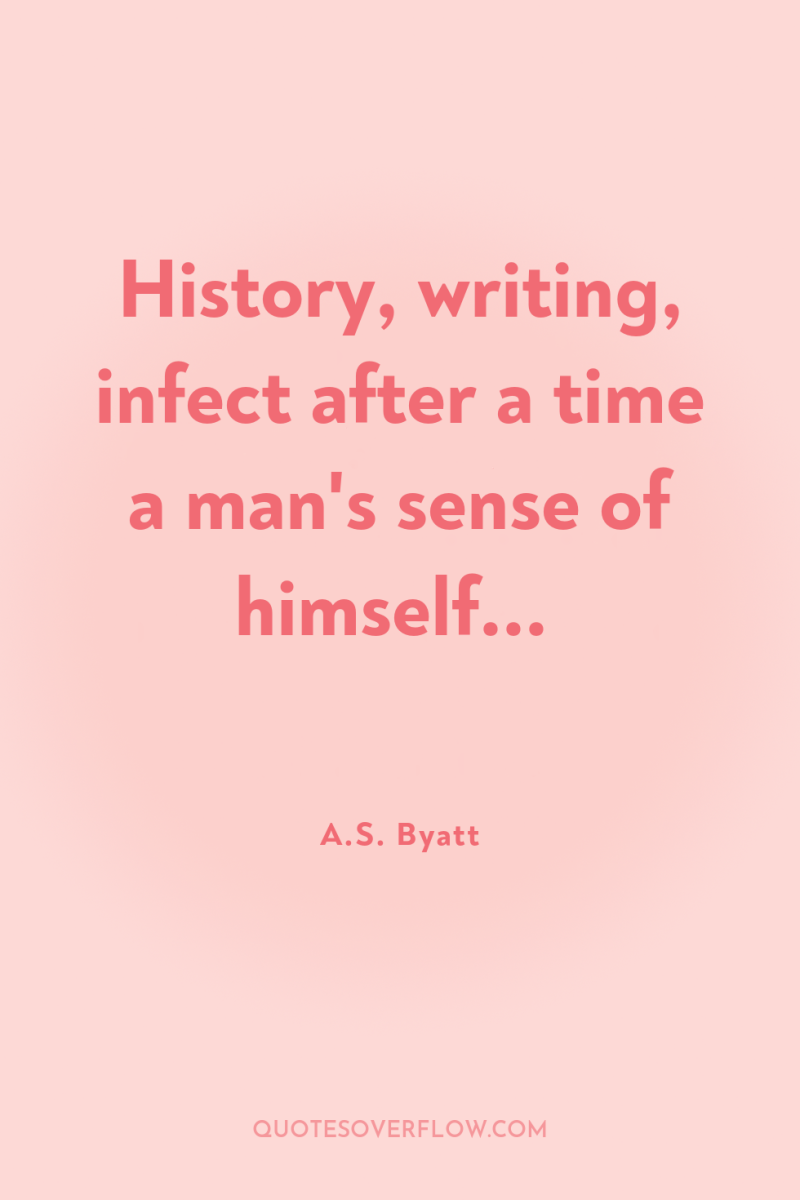1
For my true thoughts have spent more time in your company than in anyone else's, these last two or three months, and where my thoughts are, there am I, in truth".A.S. Byatt

2
The individual appears for an instant, joins the community of thought, modifies it and dies; but the species, that dies not, reaps the fruit of his ephemeral existence.A.S. Byatt
3
Above his head at street level, he saw an angled aileron of a scarlet Porsche, its jaunty fin more or less at the upper edge of his window frame. A pair of very soft, clean glistening black shoes appeared, followed by impeccably creased matt charcoal pinstriped light woollen legs, followed by the beautifully cut lower hem of a jacket, its black vent revealing a scarlet silk lining, its open front revealing a flat muscular stomach under a finely-striped red and white shirt. Val’s legs followed, in powder-blue stockings and saxe-blue shoes, under the limp hem of a crêpey mustard-coloured dress, printed with blue moony flowers. The four feet advanced and retreated, retreated and advanced, the male feet insisting towards the basement stairs, the female feet resisting, parrying. Roland opened the door and went into the area, fired mostly by what always got him, pure curiosity as to what the top half looked like.A.S. Byatt

4
You are safe with me."" I am not at all safe, with you. But I have no desire to be elsewhere.A.S. Byatt
5
Blackadder was fifty-four and had come to editing Ash out of pique. He was the son and grandson of Scottish schoolmasters. His grandfather recited poetry on firelight evenings: Marmion, Childe Harold, Ragnarok. His father sent him to Downing College in Cambridge to study under F. R. Leavis. Leavis did to Blackadder what he did to serious students; he showed him the terrible, the magnificent importance and urgency of English literature and simultaneously deprived him of any confidence in his own capacity to contribute to, or change it. The young Blackadder wrote poems, imagined Dr Leavis’s comments on them, and burned them.A.S. Byatt

6
Outside our small safe place flies mystery.A.S. Byatt

8
History, writing, infect after a time a man's sense of himself...A.S. Byatt

9
Good writing is always new.A.S. Byatt
![Contemporary' was in those days [1953] synonymous with 'modern' as...](https://cdn.quotesoverflow.com/file/quotesoverflow/images/contemporary-was-in-those-days-1953315422590698-1200.webp)
10
Contemporary' was in those days [1953] synonymous with 'modern' as it had not been before and is not now [1977].A.S. Byatt
11
Now and then there are readings that make the hairs on the neck, the non-existent pelt, stand on end and tremble, when every word burns and shines hard and clear and infinite and exact, like stones of fire, like points of stars in the dark–readings when the knowledge that we shall know the writing differently or better or satisfactorily, runs ahead of any capacity to say what we know, or how. In these readings, a sense that the text has appeared to be wholly new, never before seen, is followed, almost immediately, by the sense that it was always there, that we the readers, knew it was always there, and have always known it was as it was, though we have now for the first time recognised, become fully cognisant of, our knowledge.A.S. Byatt
12
A metamorphosis... The shining butterfly of the soul from the pupa of the body. Larva, pupa, imago. An image of art.A.S. Byatt
13
Those words .. . national and portrait. They were both to do with identity: the identity of a culture (place, language and history), the identity of an individual human being as an object for mimetic representation.A.S. Byatt
14
My Solitude is my Treasure, the best thing I have. I hesitate to go out. If you opened the little gate, I would not hop away–but oh how I sing in my gold cage.A.S. Byatt
15
The children mingled with the adults, and spoke and were spoken to. Children in these families, at the end of the nineteenth century, were different from children before or after. They were neither dolls nor miniature adults. They were not hidden away in nurseries, but present at family meals, where their developing characters were taken seriously and rationally discussed, over supper or during long country walks. And yet, at the same time, the children in this world had their own separate, largely independent lives, as children. They roamed the woods and fields, built hiding-places and climbed trees, hunted, fished, rode ponies and bicycles, with no other company than that of other children.A.S. Byatt
16
You know, all poetry may be a cry of generalised love, for this, or that, or the universe - which must be loved in its particularity, not its generality, but for its universal life in every minute particular. I have always supposed it to be a cry of ;unsatisfied love; - and so it may be indeed - for satisfaction may surfeit it and so it may die. I know many poets who write only when in an exalted state of mind which they compare to ;being in love;, when they do not simply state, that they are in love, that they seek love - for this fresh damsel - or that lively young woman - in order to find a fresh metaphor, or a new bright vision of things in themselves. And to tell you the truth, I have always believed I could diagnose this state of ;being in love; which they regard as ;most particular;, as inspired by item, one pair of black eyes or indifferent blue, ;item;, one graceful attitude of body or mind, ;item;, one female history of some twenty-two years from, shall we say 1821-1844 — I have always believed this ;in love; to be of something of the most abstract masking itself under the particular forms of both lover and beloved. And Poet who assumes and informs both.A.S. Byatt
17
Funny way to spend your life, though, studying another chap's versifying.A.S. Byatt
18
Vocabularies are crossing circles and loops. We are defined by the lines we choose to cross or to be confined by.A.S. Byatt
19
Only write to me, write to me, I love to see the hop and skip and sudden starts of your ink.A.S. Byatt
20
It [In Memoriam] expressed exactly the nature of her own shock and sorrow, the very structure and slow process of pain, and the transformations and transmutations of grief, like rot in the earth-mould, like roots and other blind things moving in the grave.A.S. Byatt
21
He had been violently confused by her real presence in the opposite inaccessible corner. For months he had been possessed by the imagination of her. She had been distant and closed away, a princess in a tower, and his imagination’s work had been all to make her present, all of her, to his mind and senses, the quickness of her and the mystery, the whiteness of her, which was part of her extreme magnetism, and the green look of those piercing or occluded eyes. Her presence had been unimaginable, or more strictly, only to be imagined. Yet here she was, and he was engaged in observing the ways in which she resembled, or differed from, the woman he dreamed, or reached for in sleep, or would fight for.A.S. Byatt
22
I think, yes, a man and a woman can be good friends, but it isn't easy for them being as no one else will suppose that that is what they are. And then there's the problem of being different sexes. I think if they are good friends, then whatever else they are - or are not - is better.A.S. Byatt
23
You are accompanied through life, Emily Jesse occasionally understood, not only by the beloved and accusing departed, but by your own ghost too, also accusing, also unappeased.A.S. Byatt
24
This is where I have always been coming to. Since my time began. And when I go away from here, this will be the mid-point, to which everything ran, before, and from which everything will run. But now, my love, we are here, we are now, and those other times are running elsewhere.A.S. Byatt
25
You wrote something easily in youth, and later you came to see how difficult it all was.A.S. Byatt
26
[H]is mouth pursed, but pursed in American, more generous than English pursing, ready for broader vowels and less mincing sounds. His body was long and lean and trim; he had American hips, ready for a neat belt and the faraway ghost of a gunbelt.A.S. Byatt
27
There are things, also, that are memories as essential and structural as bones in toes and fingers.A.S. Byatt
28
But I cannot love her as I did, because she is not open, because she withholds what matters, because she makes me, with her pride or her madness, live a lie.A.S. Byatt
29
As for Fergus. He had a habit which Maud was not experienced enough to recognise as a common one in ex-lovers of giving little tugs at the carefully severed spider-threads or puppet-strings which had once tied her to him.A.S. Byatt
30
That is human nature, that people come after you, willingly enough, provided only that you no longer love or want them.A.S. Byatt
31
She was a logical child, as far as children go. She did not understand how such a nice, kind, good God as the one they preyed to, could condemn the whole earth for sinfulness and flood it, or condemn his only Son to a disgusting death on behalf of everyone. This death did not seem to have done much good.A.S. Byatt
32
Think of this- that the writer wrote alone, and the reader read alone, and they were alone with each other.A.S. Byatt
33
They did go on so, don't you think, those Victorian poets, they took themselves so horribly seriously, " he said, pushing the lift button, summoning it from the depths. As it creaked up, Blackadder said, "That's not the worst thing a human being can do, take himself seriously.A.S. Byatt
34
I do not want to be a relative and passive being, anywhere. I want to live and love and write.A.S. Byatt
35
All scholars are a bit mad. All obsessions are dangerous.A.S. Byatt
36
Perhaps if I had made his life more difficult, he would have written less, or less freely. I cannot claim to be the midwife to genius, but if I have not facilitated, I have at least not, as many women might have done, prevented. This is a very small virtue to claim, a very negative achievement to hang my whole life on.A.S. Byatt
37
She is afraid of divorce, which will free her, as she was not enough afraid of marriage, which trapped her.A.S. Byatt
38
But if you write a version of Ragnarok in the twenty-first century, it is haunted by the imagining of a different end of things. We are a species of animal which is bringing about the end of the world we were born into. Not out of evil or malice, or not mainly, but because of a lopsided mixture of extraordinary cleverness, extraordinary greed, extraordinary proliferation of our own kind, and a biologically built-in short-sightedness.A.S. Byatt
39
It is good for a man to invite his ghosts into his warm interior, out of the wild night, into the firelight, out of the howling dark.A.S. Byatt
40
The black thing in her brain and the dark water on the page were the same thing, a form of knowledge. This is how myths work. They are things, creatures, stories, inhabiting the mind. They cannot be explained and do not explain; they are neither creeds nor allegories. The black was now in the thin child’s head and was part of the way she took in every new thing she encountered.A.S. Byatt
41
Think of this — that the writer wrote alone, and the reader read alone, and they were alone with each other. True, the writer may have been alone also with Spenser's golden apples in the Faerie Queene, Proserpina's garden, glistening bright among the place's ashes and cinders, may have seen in his mind's eye, apple of his eye, the golden fruit of the Primavera, may have seen Paradise Lost, in the garden where Eve recalled Pomona and Proserpina. He was alone when he wrote and he was not alone then, all these voices sang, the same words, golden apples, different words in different places, an Irish castle, un unseen cottage, elastic-walled and grey round blind eyes.A.S. Byatt
42
The reading eye must do the work to make them live, and so it did, again and again, never the same life twice, as the artist had intended.A.S. Byatt
43
It was immediately clear that the book had been undisturbed for a very long time, perhaps even since it had been laid to rest. The librarian fetched a checked duster, and wiped away the dust, a black, thick, tenacious Victorian dust, a dust composed of smoke and fog particles accumulated before the Clean Air acts.A.S. Byatt
44
She grew up in the ordinary paradise of the English countryside. When she was five she walked to school, two miles, across meadows covered with cowslips, buttercups, daisies, vetch, rimmed by hedges full of blossom and then berries, blackthorn, hawthorn, dog-roses, the odd ash tree with its sooty buds.A.S. Byatt
45
Once upon a time, when men and women hurtled through the air on metal wings, when they wore webbed feet and walked on the bottom of the sea, learning the speech of whales and the songs of the dolphins, when pearly-fleshed and jewelled apparitions of Texan herdsmen and houris shimmered in the dusk on Nicaraguan hillsides, when folk in Norway and Tasmania in dead of winter could dream of fresh strawberries, dates, guavas and passion fruits and find them spread next morning on their tables, there was a woman who was largely irrelevant, and therefore happy.A.S. Byatt
46
In the end it wins a king's daughter, who is expected to burn its hedgehog-skin at night, and does so, and finds herself clasping a beautiful prince, all singed and soot-black. Christabel says, 'And if he regretted his armoury of spines and his quick wild wits, history does not relate, for we must go no further, having reached the happy end.A.S. Byatt
47
You will not be here-- I shall not be here--much loA.S. Byatt
48
He was a compact, clearcut man, with precise features, a lot of very soft black hair, and thoughtful dark brown eyes. He had a look of wariness, which could change when he felt relaxed or happy, which was not often in these difficult days, into a smile of amused friendliness and pleasure which aroused feelings of warmth, and something more, in many women.A.S. Byatt